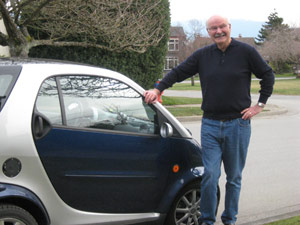
Canada could have a comprehensive climate change action plan by June 2010. All the elements are there, if only we could see them. Greenhouse gas reductions of over 80 per cent are possible by 2040.
Impossible! some skeptics would say.
Very possible! this grizzled old political veteran believes.
What's the evidence? What's the plan?
The evidence lies with our cities -- the nine big and about 110 medium-sized cities where more than 90 per cent of Canadians either reside or live within an hour's commute. That's where the greenhouse gases are created. They are created by how we house, transport, power, feed ourselves. Those cities are where we consume too much. People in cities produce one half of Canada's greenhouse gases. The other half comes from the oil and gas fields, farms, mines, and forestry mills, whose products are shipped from rural areas to be consumed by people living in cities.
Fortunately, many Canadians have thought about city-based consumption, how we mitigate and adapt to the resulting greenhouse gas and climate change consequences. Sustainable cities and communities strategies and approaches have blossomed in the last five to six years.
Some examples are to be found on the Vancouver-based Sustainable Cities PLUS Network, which won the International Gas Unions 2003 Grand Prize as the world's best long term sustainable cities strategy.
Other examples are Whistler's Natural Step approach, Imagine Calgary and North Vancouver City's Sustainability Vision and Sustainability by Design Initiative offshoot from the CitiesPLUS initiative. As well, the National Round Table on the Environment and the Economy produced a very good report in 2003 called Environmental Quality in Canadian Cities: The Federal Role. Also, the prime minister's task force submitted a report in 2006 called "From Restless Communities to Resilient Places: Building a Stronger Future for All Canadians." That report advocated a national role in helping to create sustainable cities and communities.
Sprawl busters
Many mayors and their councils already have recognized they are the solution, and have plans.
For example, Mayor Gregor Robertson has just launched a 10-year Greenest City Action Plan to make Vancouver the greenest city in the world.
Surrey Mayor Diane Watts and her counterparts in Coquitlam, Abbotsford and Langley -- other Lower Mainland high growth communities -- have launched sustainability charters and a joint Liveability Accord. The goal: No more sprawl. Smart Growth planning will produce higher density mixed-use city centres and transit corridors, and a huge increase in walking, cycling and transit. They're working with QUEST (Quality Urban Energy Systems of Tomorrow), a collaborative network with representatives from industry, environmental groups and government to create integrated, renewable energy approaches serving the region.
Calgary is one of many more cities across the country that has accepted long-term sustainability strategies. Guelph is implementing a community energy plan as part of its sustainability vision. Regional municipal associations like B.C.'s North Central Municipal Association (representing the 40 municipalities, regional districts and some First Nations communities) are sharing ideas on how to implement sustainability strategies. The Union of British Columbia Municipalities and many other municipal associations across Canada have aggressive urban sustainability and greenhouse gas reduction initiatives under way. So does the Federation of Canadian Municipalities.
Billions for sustainable infrastructure
What's surprising, is how underreported in the media, yet how impressive, such federal and provincial actions have been in the last 15 years:
- The federal government’s infrastructure funding for municipal sewer, water, roads and bridges, transit ($750 million for Vancouver's Canada Line), gas tax agreements, and other programs now pump more than $5 billion per year into municipal sustainability programs.
- Provinces like Ontario (Places to Grow), B.C. (Climate Change Action Plan), Alberta, Quebec and others are likewise engaged.
- As well, there is federal provincial cooperation around community sustainable energy initiatives. In September, the Council of Energy Ministers agreed to a national approach called "Integrated Community Energy Solutions -- A Road Map for Action".
So there should be no doubt that the elements of a national plan are emerging in our cities and communities, provinces and national government.
What's missing is a clearly articulated vision binding all these initiatives and cooperative actions. It should be a national project, on the scale of the building of the Canadian Pacific Railway or the St. Lawrence Seaway.
Focus on fixing cities
Instead, all those incredibly exciting sustainable initiatives across Canada are lost in the cacophony of competing claims about the Kyoto Accord. We suffer through deadening legalistic argument about dates, deadlines and targets leading into December's Copenhagen climate change meetings (which will resolve nothing). Canada is seen as the laggard.
Enough of this nonsense! We will not reduce greenhouse gas emissions, we will not mitigate or adapt to global warning, we won't take a leadership role internationally -- until we clearly focus on our 21st century imperative. That imperative -- in this urban century when 3/4 of the world's nine billion population will live in cities -- is to transform the way we live in our cities and communities. We need to consume far less of our earth's natural capital of water, soil, forest, and oceans. Right now in North America we're consuming the equivalent of four Earths’ natural capital!
As a political and community activist for the last 40 years, I can tell you: Fix the way we do cities and you'll fix the greenhouse gas and climate change disaster we and our children face. Set all the quotas, targets, emission standards you want. Squabble and demonstrate in Copenhagen. It's all a waste unless we move rapidly and boldly towards creating sustainable Canadian cities and communities. ![]()
Read more: Environment, Urban Planning + Architecture














Tyee Commenting Guidelines
Comments that violate guidelines risk being deleted, and violations may result in a temporary or permanent user ban. Maintain the spirit of good conversation to stay in the discussion.
*Please note The Tyee is not a forum for spreading misinformation about COVID-19, denying its existence or minimizing its risk to public health.
Do:
Do not: